一般将来时练习题及答案,部分难题有详解精编版
一般将来时专项练习题及答案详解
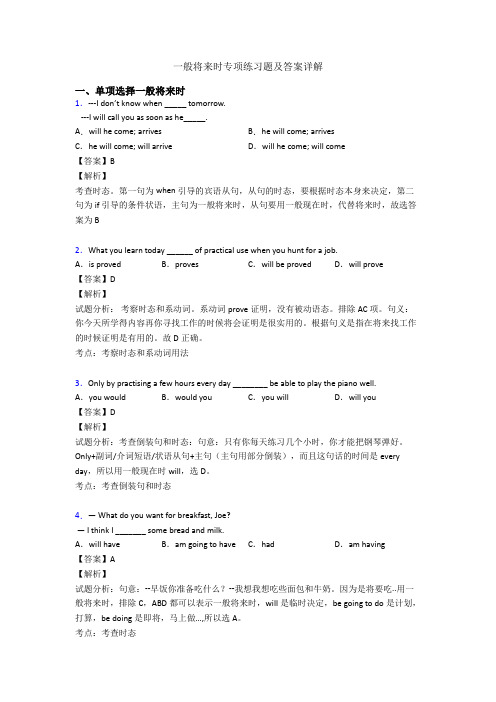
一般将来时专项练习题及答案详解一、单项选择一般将来时1.---I don’t know when _____ tomorrow.---I will call you as soon as he_____.A.will he come; arrives B.he will come; arrivesC.he will come; will arrive D.will he come; will come【答案】B【解析】考查时态。
第一句为when 引导的宾语从句,从句的时态,要根据时态本身来决定,第二句为if 引导的条件状语,主句为一般将来时,从句要用一般现在时,代替将来时,故选答案为B2.What you learn today ______ of practical use when you hunt for a job.A.is proved B.proves C.will be proved D.will prove【答案】D【解析】试题分析:考察时态和系动词。
系动词prove证明,没有被动语态。
排除AC项。
句义:你今天所学得内容再你寻找工作的时候将会证明是很实用的。
根据句义是指在将来找工作的时候证明是有用的。
故D正确。
考点:考察时态和系动词用法3.Only by practising a few hours every day ________ be able to play the piano well.A.you would B.would you C.you will D.will you【答案】D【解析】试题分析:考查倒装句和时态:句意:只有你每天练习几个小时,你才能把钢琴弹好。
Only+副词/介词短语/状语从句+主句(主句用部分倒装),而且这句话的时间是every day,所以用一般现在时will,选D。
考点:考查倒装句和时态4.— What do you want for breakfast, Joe?— I think I _______ some bread and milk.A.will have B.am going to have C.had D.am having【答案】A【解析】试题分析:句意:--早饭你准备吃什么?--我想我想吃些面包和牛奶。
(完整版)一般将来时态讲解及练习和答案
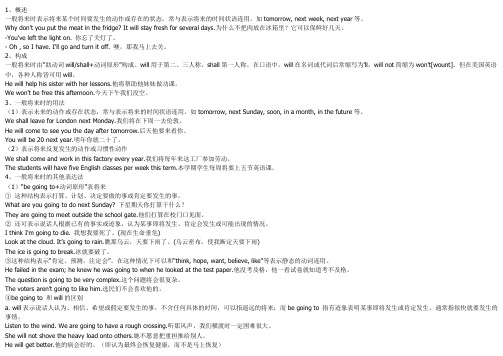
1、概述一般将来时表示将来某个时间要发生的动作或存在的状态,常与表示将来的时间状语连用,如tomorrow, next week, next year等。
Why don’t you put the meat in the fridge? It will stay fresh for several days.为什么不把肉放在冰箱里?它可以保鲜好几天。
-You've left the light on. 你忘了关灯了。
- Oh , so I have. I'll go and turn it off. 噢,那我马上去关。
2、构成一般将来时由“助动词will/shall+动词原形”构成。
will用于第二、三人称,shall第一人称。
在口语中,will在名词或代词后常缩写为'll,will not简缩为won’t[wount]。
但在美国英语中,各种人称皆可用will。
He will help his sister with her lessons.他将帮助他妹妹做功课。
We won't be free this afternoon.今天下午我们没空。
3、一般将来时的用法(1)表示未来的动作或存在状态,常与表示将来的时间状语连用,如tomorrow, next Sunday, soon, in a month, in the future等。
We shall leave for London next Monday.我们将在下周一去伦敦。
He will come to see you the day after tomorrow.后天他要来看你。
You will be 20 next year.明年你就二十了。
(2)表示将来反复发生的动作或习惯性动作We shall come and work in this factory every year.我们将每年来这工厂参加劳动。
英语一般将来时试题(有答案和解析)含解析
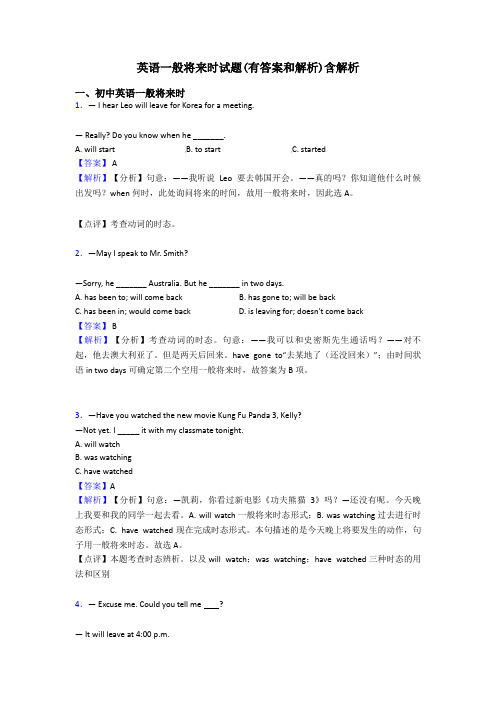
英语一般将来时试题(有答案和解析)含解析一、初中英语一般将来时1.— I hear Leo will leave for Korea for a meeting.— Really? Do you know when he _______.A. will startB. to startC. started【答案】 A【解析】【分析】句意:——我听说Leo要去韩国开会。
——真的吗?你知道他什么时候出发吗?when何时,此处询问将来的时间,故用一般将来时,因此选A。
【点评】考查动词的时态。
2.—May I speak to Mr. Smith?—Sorry, he _______ Australia. But he _______ in two days.A. has been to; will come backB. has gone to; will be backC. has been in; would come backD. is leaving for; doesn't come back【答案】 B【解析】【分析】考查动词的时态。
句意:——我可以和史密斯先生通话吗?——对不起,他去澳大利亚了。
但是两天后回来。
have gone to“去某地了(还没回来)”;由时间状语in two days可确定第二个空用一般将来时,故答案为B项。
3.—Have you watched the new movie Kung Fu Panda 3, Kelly?—Not yet. I _____ it with my classmate tonight.A. will watchB. was watchingC. have watched【答案】A【解析】【分析】句意:—凯莉,你看过新电影《功夫熊猫3》吗?—还没有呢。
今天晚上我要和我的同学一起去看。
A. will watch一般将来时态形式;B. was watching过去进行时态形式;C. have watched现在完成时态形式。
高考英语一般将来时题20套(带答案)及解析
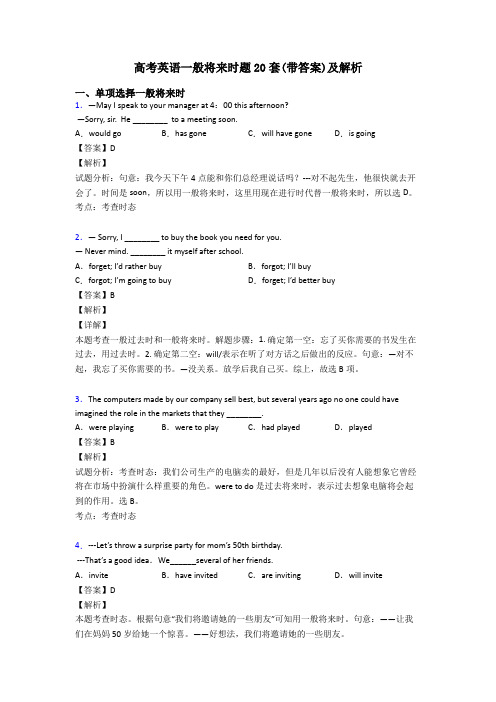
高考英语一般将来时题20套(带答案)及解析一、单项选择一般将来时1.—May I speak to your manager at 4:00 this afternoon?—Sorry, sir. He ________ to a meeting soon.A.would go B.has gone C.will have gone D.is going【答案】D【解析】试题分析:句意:我今天下午4点能和你们总经理说话吗?---对不起先生,他很快就去开会了。
时间是soon,所以用一般将来时,这里用现在进行时代替一般将来时,所以选D。
考点:考查时态2.— Sorry, I ________ to buy the book you need for you.— Never mind. ________ it myself after school.A.forget; I’d rather buy B.forgot; I’ll buyC.forgot; I’m going to buy D.forget; I’d better buy【答案】B【解析】【详解】本题考查一般过去时和一般将来时。
解题步骤:1. 确定第一空:忘了买你需要的书发生在过去,用过去时。
2. 确定第二空:will/表示在听了对方话之后做出的反应。
句意:—对不起,我忘了买你需要的书。
—没关系。
放学后我自己买。
综上,故选B项。
3.The computers made by our company sell best, but several years ago no one could have imagined the role in the markets that they ________.A.were playing B.were to play C.had played D.played【答案】B【解析】试题分析:考查时态:我们公司生产的电脑卖的最好,但是几年以后没有人能想象它曾经将在市场中扮演什么样重要的角色。
【英语】一般将来时难题及答案
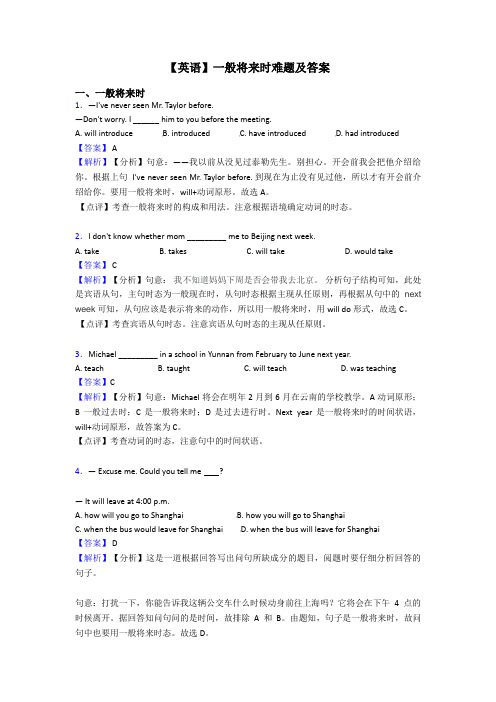
【英语】一般将来时难题及答案一、一般将来时1.—I've never seen Mr. Taylor before.—Don't worry. I ______ him to you before the meeting.A. will introduceB. introducedC. have introducedD. had introduced【答案】 A【解析】【分析】句意:——我以前从没见过泰勒先生。
别担心。
开会前我会把他介绍给你。
根据上句 I've never seen Mr. Taylor before. 到现在为止没有见过他,所以才有开会前介绍给你。
要用一般将来时,will+动词原形。
故选A。
【点评】考查一般将来时的构成和用法。
注意根据语境确定动词的时态。
2.I don't know whether mom _________ me to Beijing next week.A. takeB. takesC. will takeD. would take【答案】 C【解析】【分析】句意:我不知道妈妈下周是否会带我去北京。
分析句子结构可知,此处是宾语从句,主句时态为一般现在时,从句时态根据主现从任原则,再根据从句中的next week可知,从句应该是表示将来的动作,所以用一般将来时,用will do形式,故选C。
【点评】考查宾语从句时态。
注意宾语从句时态的主现从任原则。
3.Michael _________ in a school in Yunnan from February to June next year.A. teachB. taughtC. will teachD. was teaching【答案】C【解析】【分析】句意:Michael将会在明年2月到6月在云南的学校教学。
A动词原形;B一般过去时;C是一般将来时;D是过去进行时。
Next year是一般将来时的时间状语,will+动词原形,故答案为C。
英语一般将来时专题练习(及答案)及解析
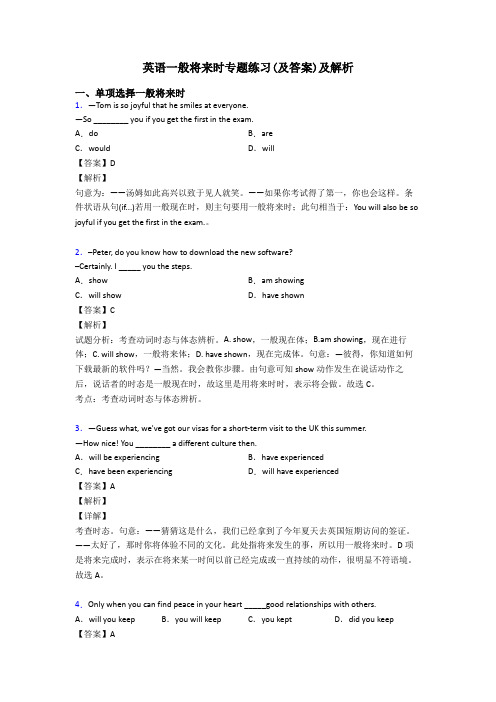
C.would have increasedD.will be increasing
【答案】B
【解析】
试题分析:考查时态。If条件句使用的是一般现在时代替一般将来时,所以主句也是一般将来时,和next year搭配使用。句意:如果我们的营销计划成功,我们明年销售将增加百分之三十。故B正确。
【解析】
句意为:——汤姆如此高兴以致于见人就笑。——如果你考试得了第一,你也会这样。条件状语从句(if...)若用一般现在时,则主句要用一般将来时;此句相当于:You will also be so joyful if you get the first in the exam.。
2.–Peter, do you know how to download the new software?
19.If he ________ exercise, he______ healthy.
A.not; will B.isn’t; won’t be
C.doesn’t; will be D.doesn’t do; won’t be
【答案】D
【解析】
【详解】
考查if条件句中的时态。句意:如果他不做运动,他就不会健康。If条件句,如果主句用一般将来时态,则从句用一般现在时态,且句子主语是he,单数第三人称,故选D。
考点:考查时态
10.It is required that the students _____ mobile phones in their school, so seldom _____ them using one.
A.should not use; you will see
【英语】 一般将来时练习题基础、提高、难题_汇总(含答案)(word)

【英语】一般将来时练习题基础、提高、难题_汇总(含答案)(word)一、一般将来时1.—Have you finished the poster for the party?—Not yet. I it in two days.A. finishB. finishedC. will finishD. have finished【答案】 C【解析】【分析】此题的关键点在“in two days”和一般将来时连用,故选C。
句意是:—你已经完成聚会的海报了吗?—还没有,我会在两个以后完成的。
【点评】本题考查介词短语“ in +时间段”用于一般将来时。
2.I don't know whether mom _________ me to Beijing next week.A. takeB. takesC. will takeD. would take【答案】 C【解析】【分析】句意:我不知道妈妈下周是否会带我去北京。
分析句子结构可知,此处是宾语从句,主句时态为一般现在时,从句时态根据主现从任原则,再根据从句中的next week可知,从句应该是表示将来的动作,所以用一般将来时,用will do形式,故选C。
【点评】考查宾语从句时态。
注意宾语从句时态的主现从任原则。
3.Michael _________ in a school in Yunnan from February to June next year.A. teachB. taughtC. will teachD. was teaching【答案】C【解析】【分析】句意:Michael将会在明年2月到6月在云南的学校教学。
A动词原形;B一般过去时;C是一般将来时;D是过去进行时。
Next year是一般将来时的时间状语,will+动词原形,故答案为C。
【点评】考查动词的时态,注意句中的时间状语。
4.— There ________a football match on TV tonight. I can't wait to watch it.— Me, too. It's ________ Guangzhou Evergrande and the Australian team Melbourne Victory.A. will be; betweenB. will be; bothC. will have; betweenD. will have; both【答案】A【解析】【分析】句意为:---今晚将有一场电视直播足球比赛,我非常想看。
英语一般将来时练习题及答案及解析
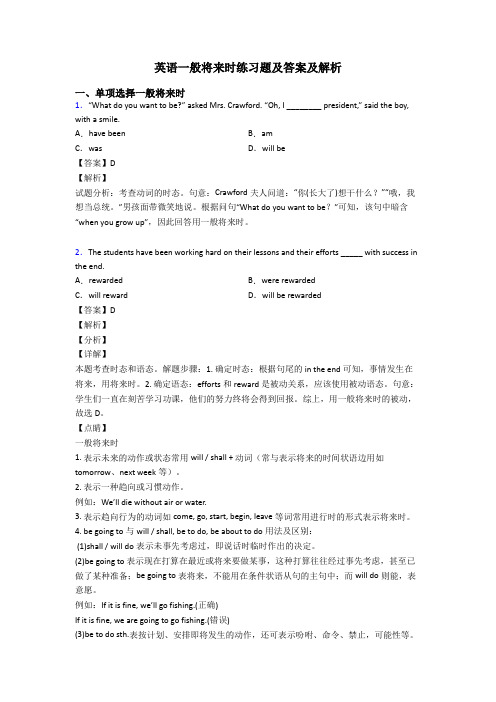
英语一般将来时练习题及答案及解析一、单项选择一般将来时1.“What do you want to be?” asked Mrs. Crawford. “Oh, I ________ president,” said the boy, with a smile.A.have been B.amC.was D.will be【答案】D【解析】试题分析:考查动词的时态。
句意:Crawford夫人问道:“你(长大了)想干什么?”“哦,我想当总统。
”男孩面带微笑地说。
根据问句“What do you want to be?”可知,该句中暗含“when you grow up”,因此回答用一般将来时。
2.The students have been working hard on their lessons and their efforts _____ with success in the end.A.rewarded B.were rewardedC.will reward D.will be rewarded【答案】D【解析】【分析】【详解】本题考查时态和语态。
解题步骤:1. 确定时态:根据句尾的in the end可知,事情发生在将来,用将来时。
2. 确定语态:efforts和reward是被动关系,应该使用被动语态。
句意:学生们一直在刻苦学习功课,他们的努力终将会得到回报。
综上,用一般将来时的被动,故选D。
【点睛】一般将来时1. 表示未来的动作或状态常用will / shall + 动词(常与表示将来的时间状语边用如tomorrow、next week等)。
2. 表示一种趋向或习惯动作。
例如:We’ll die without air or water.3. 表示趋向行为的动词如come, go, start, begin, leave等词常用进行时的形式表示将来时。
4. be going to与will / shall, be to do, be about to do用法及区别:(1)shall / will do表示未事先考虑过,即说话时临时作出的决定。
(完整版)一般将来时练习题(含答案)
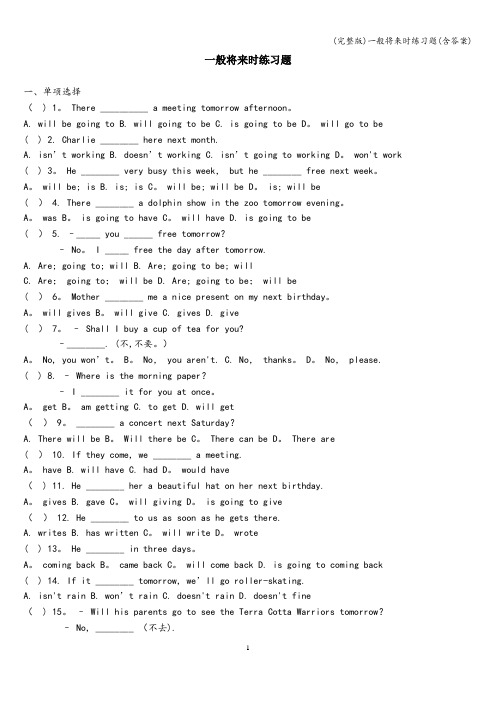
一般将来时练习题一、单项选择( ) 1。
There __________ a meeting tomorrow afternoon。
A. will be going toB. will going to beC. is going to be D。
will go to be ( ) 2. Charlie ________ here next month.A. isn’t workingB. doesn’t workingC. isn’t going to working D。
won't work ( ) 3。
He ________ very busy this week, but he ________ free next week。
A。
will be; is B. is; is C。
will be; will be D。
is; will be( ) 4. There ________ a dolphin show in the zoo tomorrow evening。
A。
was B。
is going to have C。
will have D. is going to be( ) 5. –_____ you ______ free tomorrow?– No。
I _____ free the day after tomorrow.A. Are; going to; willB. Are; going to be; willC. Are; going to; will beD. Are; going to be; will be( ) 6。
Mother ________ me a nice present on my next birthday。
A。
will gives B。
will give C. gives D. give( ) 7。
– Shall I buy a cup of tea for you?–________. (不,不要。
一般将来时 专项练习及答案详解

【解析】
试题分析:考查时态。能不能写完应是将来发生的动作,因此应用将来时。句意:——Lucy,你的作文写得怎样了?——我重写了太多次了,我怀疑能不能写完。故D正确。
考点:考查时态
6.The sky is clouding over;we can see there ________ a rainstorm.
【解析】
试题分析:考查close的用法。由题目可知,不是回答者不关窗,而是窗子由于种种原因(窗子坏了)关不了,they指代窗户为主语,因此为主动。Close既可作及物动词,又可作不及物动词,此句中为不及物动词,句意为你的窗户还是开的,真是太冷的。对不起,它们关不了。故选B。
考点:考查close的用法。
—Sorry, sir. Just a minute. There ________ a table available.
A.isB.wasC.will beD.has been
【答案】C
【解析】
考查动词时态。句意为:我究竟要等多长时间?对不起,先生。再等一会儿,马上就有空桌子了。由语境可知,此处应用将来时,表示“将要有张桌子”。故答案选C。
考点:考查倒装句和时态
点评:固定句式:it be一段时间before从句;当Before引导的时间状语从句中使用一般现在时的时候,前面的主句使用将来时。May放在句首,运用倒装句表示对对方的祝愿。
15.Japan’s economyin the past twenty years. No one knows how long itbefore it regains its increase.
C.have been experiencingD.will have experienced
(英语)英语一般将来时真题汇编(含答案)及解析
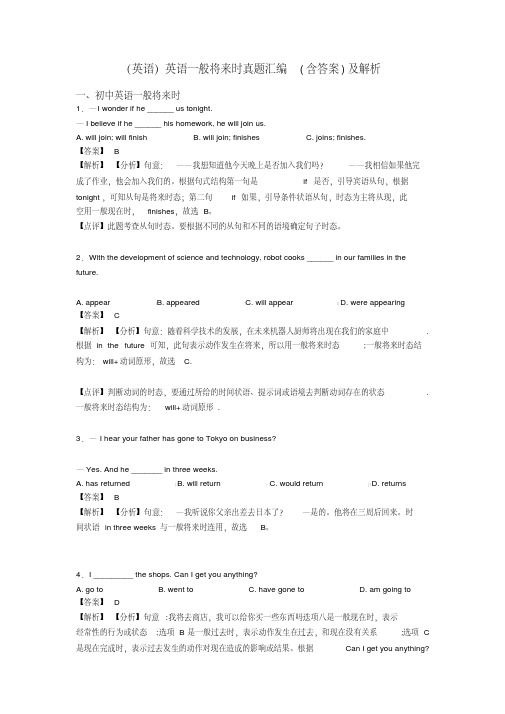
(英语)英语一般将来时真题汇编(含答案)及解析一、初中英语一般将来时1.—I wonder if he ______ us tonight.— I believe if he ______ his homework, he will join us.A. will join; will finishB. will join; finishesC. joins; finishes.【答案】 B【解析】【分析】句意:——我想知道他今天晚上是否加入我们吗?——我相信如果他完成了作业,他会加入我们的。
根据句式结构第一句是if是否,引导宾语从句,根据tonight,可知从句是将来时态;第二句if如果,引导条件状语从句,时态为主将从现,此空用一般现在时,finishes,故选B。
【点评】此题考查从句时态。
要根据不同的从句和不同的语境确定句子时态。
2.With the development of science and technology, robot cooks ______ in our families in the future.A. appearB. appearedC. will appearD. were appearing【答案】 C【解析】【分析】句意:随着科学技术的发展,在未来机器人厨师将出现在我们的家庭中. 根据in the future可知,此句表示动作发生在将来,所以用一般将来时态;一般将来时态结构为:will+动词原形,故选 C.【点评】判断动词的时态,要通过所给的时间状语、提示词或语境去判断动词存在的状态. 一般将来时态结构为:will+动词原形.3.— I hear your father has gone to Tokyo on business?— Yes. And he _______ in three weeks.A. has returnedB. will returnC. would returnD. returns【答案】 B【解析】【分析】句意:—我听说你父亲出差去日本了?—是的。
【一般将来时】全国通用(含答案及详细解析)
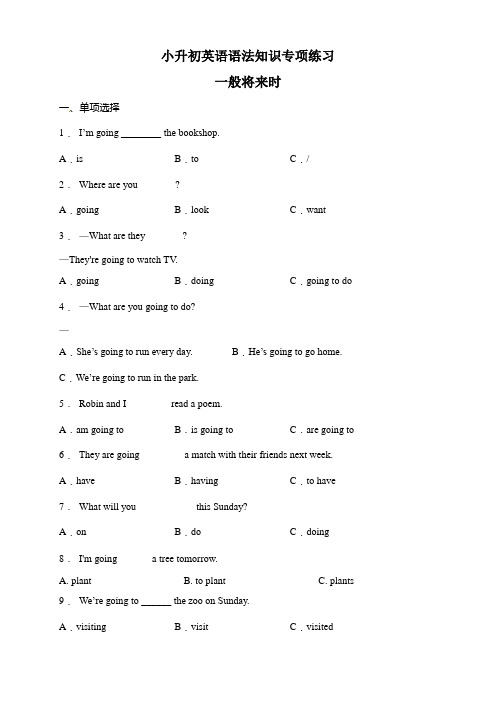
小升初英语语法知识专项练习一般将来时一、单项选择1.I’m going ________ the bookshop.A.is B.to C./ 2.Where are you _______?A.going B.look C.want 3.—What are they _______?—They're going to watch TV.A.going B.doing C.going to do 4.—What are you going to do?—________A.She’s going to run every day.B.He’s going to go home. C.We’re going to run in the park.5.Robin and I ________ read a poem.A.am going to B.is going to C.are going to 6.They are going ________ a match with their friends next week. A.have B.having C.to have 7.What will you ___________ this Sunday?A.on B.do C.doing8.I'm going ______ a tree tomorrow.A. plantB. to plantC. plants 9.We’re going to ______ the zoo on Sunday.A.visiting B.visit C.visited10.There __________ a sports meeting in the playground next Monday.A. is going to haveB. will haveC. is going to be 11.If you _________ work hard, you _________ pass the exam.A. won't, won'tB. won't, can'tC. don't, don'tD. don't, won't 12.What are you ________ to do this afternoon?A.going B.go C.goes 13.Daming and Si mon ____ to America next year.A. goesB. aregoing C. went D. go14.We are going _______.A.seeing ducks B.to see ducks C.to see duck 15.We ______have a football match tomorrow.A. are goingB. are go toC. are going to 16.—______ are they going to____ tomorrow?—They are going to have a party.A.When; doB.What; goC.What; do17.________ you pick peaches?A.Will B.Are C.Is18.—What are you going to do on Saturday?—________A.I’m going to see my grandparents.B.I see my grandparents. 19.Xiaoyong is going to ________ in the park.A.running B.run C.runs20.Mary is going to check her email ________.21.What are you ________ to buy this afternoon?A.going B.go C.goes22.I _______ buy a new hat.A.be going to B.going to C.am going D.am going to 23.I’m ________ the bookstore this afternoon ________ bus.A.going; by B.going; by a C.going to; by D.go to; in a 24.My family _______ going to get together this evening.A.are B.will C.am25.I'm going to buy a comic book ________.A.on Sundays B.next week C.yesterday 26.The friend s in Grade 6 _______ going to say goodbye.A.is B.are C.will27.I’m _________ to bring back some sausages for you!A.going B.goes C.go28.She is going to take a trip ________.A.next week B.yesterday C.last Friday 29.What ________ you ________ to do this afternoon?A.are; going B.do; do C.about; go 30.—When are you going to the Summer Palace?—________A.Three days ago. B.This afternoon. C.Every Sunday. D.Last year. 31.I am _______ eat breakfast at 7:15.A.going to B.will C.to D.for32.I _____ the Great Wall next year.A.go to visit B.will visit C.visited33.—Where are you going this afternoon?—________.A.I'm doing my homework B.I'm going to the bookstoreC.I'm going there by bike34.—Where is Tom going?—He ______ the shop.A.is going B.is going to C.is go to35.—_______ be hot?—Yes, _______.A.W ill; is it B.Will it; it will C.Will; it won't D.Will it; it is 36.Jill ________ wear glasses in the future.A.won’t B.doesn’t C.isn’t37.In the future, the computers ________ us see dinosaurs in class.A.help B.helped C.will help D.to help38.The Chinese space station ________ ready in 2022.A.will be B.gets39.I’m going to swim ______.A.now B.yesterday C.tomorrow40.________ you going to run?A.Are B.Is C.Do41.—________ are you going to do?—I’m going to swim.A.Who B.What C.Where42.—What's the weather _______ like in Xi'an?—It will be snowy.A.is going to be B.go to be C.going to be43.They will _______ the dining room.A.decorating B.decorates C.decorate44.How are you ________ celebrate?A.go to B.going to C.will to D./45.— your father you to the park tomorrow?—Yes, tomorrow is Sunday.A. Do, takeB. Did, takeC. Will, take46.We’re going ________ visit them.A.to B.too C.two47.—What are you going to do this afternoon?—________.A.I'm going to buy a book B.I'm a student C.I'm going to school by bike 48.—Where are you going this afternoon?—________A.I’m going to buy some books.B.I’m going to the bookstore.C.Can I help you? D.I’m going to visit my aunt.49.It will ______ in Beijing.A.be sunny B.sun C.sunning50.—Where ______ you ______?—I am going home.A.are; go B.are; going C.are; do一般将来时(参考答案)一、单项选择1.【答案】B【解析】句意:我将要去书店。
(完整word版)一般将来时练习题及答案学习(可编辑修改word版)

A.arehavingB.aregoingtohaveC.willhavingD.isgoingtohave
()22.
you
freenextSunday?
A.Will;areB.Will;beC.Do;beD.Are;be
()23.Hethereattentomorrowmorning.
A.doB.willdoC.goingtodoD.willdoing
()18.Tomorrowheinthepark.
akiteintheopenairfirst,andthen
boating
A.willfly;willgoB.willfly;goesC.isgoingtofly;willgoesD.flies;willgo
()28.–Let’sgoouttoplayfootball,shallwe?–OK.I.
eD.amcoming
()29.ItusalongtimetolearnEnglishwell.
A.takesB.willtakeC.spendsD.willspend
②Theboyistogotoschooltomorrow.这个男孩明天要去上学。四.“beaboutto+动词原形”表示即将发生的动作,意为:很快,
马上。后面一般不跟时间状语。例如:
Weareabouttoleave.我们马上就走。
五.某些词,如come,go,leave,arrive,start,get,
A.Yes,pleaseB.Yes,youwill.C.No,please.D.No,youwon’t.
()26.Ittheyearofthehorsenextyear.
一般将来时练习题含答案及解析
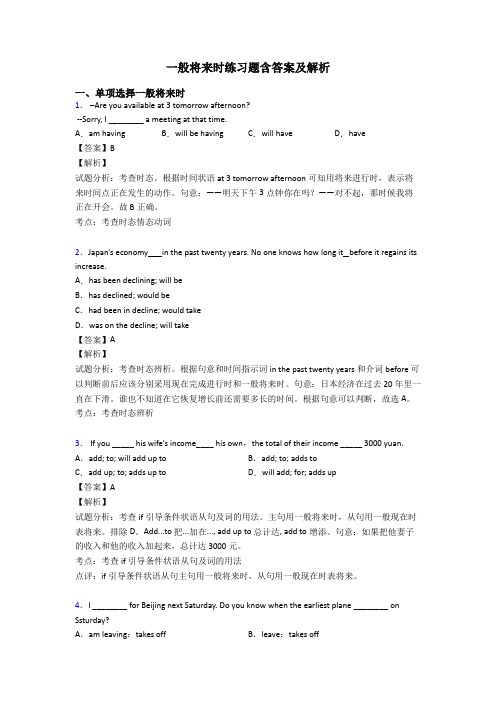
一般将来时练习题含答案及解析一、单项选择一般将来时1.–Are you available at 3 tomorrow afternoon?--Sorry, I ________ a meeting at that time.A.am having B.will be having C.will have D.have【答案】B【解析】试题分析:考查时态。
根据时间状语at 3 tomorrow afternoon可知用将来进行时,表示将来时间点正在发生的动作。
句意:——明天下午3点钟你在吗?——对不起,那时候我将正在开会。
故B正确。
考点:考查时态情态动词2.Japan’s economy in the past twenty years. No one knows how long it before it regains its increase.A.has been declining; will beB.has declined; would beC.had been in decline; would takeD.was on the decline; will take【答案】A【解析】试题分析:考查时态辨析。
根据句意和时间指示词in the past twenty years和介词before 可以判断前后应该分别采用现在完成进行时和一般将来时。
句意:日本经济在过去20年里一直在下滑。
谁也不知道在它恢复增长前还需要多长的时间。
根据句意可以判断,故选A。
考点:考查时态辨析3.If you _____ his wife’s income____ his own,the total of their income _____ 3000 yuan. A.add; to; will add up to B.add; to; adds toC.add up; to; adds up to D.will add; for; adds up【答案】A【解析】试题分析:考查if引导条件状语从句及词的用法。
【英语】 英语一般将来时专题练习(及答案)含解析
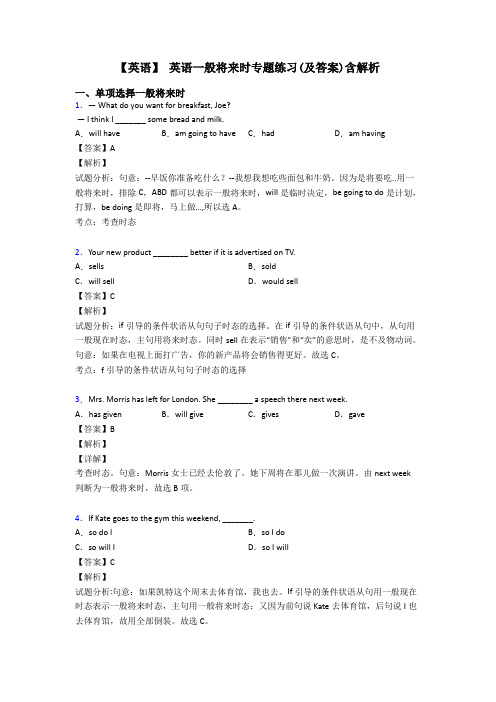
【英语】英语一般将来时专题练习(及答案)含解析一、单项选择一般将来时1.— What do you want for breakfast, Joe?— I think I _______ some bread and milk.A.will have B.am going to have C.had D.am having【答案】A【解析】试题分析:句意:--早饭你准备吃什么?--我想我想吃些面包和牛奶。
因为是将要吃..用一般将来时,排除C,ABD都可以表示一般将来时,will是临时决定,be going to do是计划,打算,be doing是即将,马上做…,所以选A。
考点:考查时态2.Your new product ________ better if it is advertised on TV.A.sells B.soldC.will sell D.would sell【答案】C【解析】试题分析:if引导的条件状语从句句子时态的选择。
在if引导的条件状语从句中,从句用一般现在时态,主句用将来时态。
同时sell在表示“销售”和“卖”的意思时,是不及物动词。
句意:如果在电视上面打广告,你的新产品将会销售得更好。
故选C。
考点:f引导的条件状语从句句子时态的选择3.Mrs. Morris has left for London. She ________ a speech there next week.A.has given B.will give C.gives D.gave【答案】B【解析】【详解】考查时态。
句意:Morris女士已经去伦敦了。
她下周将在那儿做一次演讲。
由next week判断为一般将来时,故选B项。
4.If Kate goes to the gym this weekend, _______.A.so do I B.so I doC.so will I D.so I will【答案】C【解析】试题分析:句意:如果凯特这个周末去体育馆,我也去。
高中一般将来时练习题及答案详解
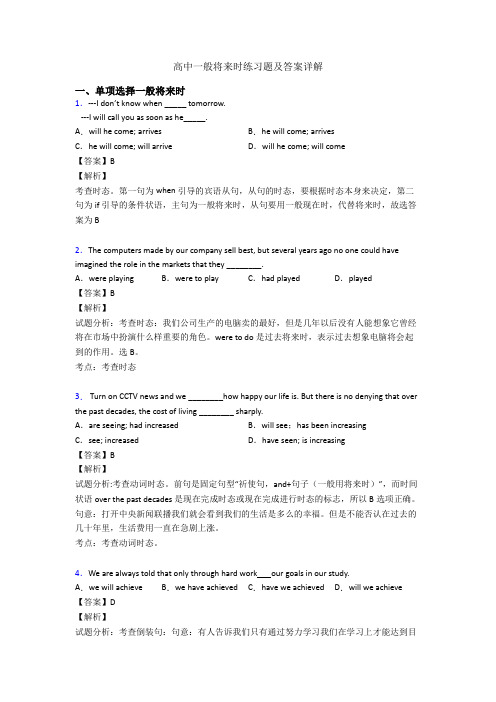
高中一般将来时练习题及答案详解一、单项选择一般将来时1.---I don’t know when _____ tomorrow.---I will call you as soon as he_____.A.will he come; arrives B.he will come; arrivesC.he will come; will arrive D.will he come; will come【答案】B【解析】考查时态。
第一句为when 引导的宾语从句,从句的时态,要根据时态本身来决定,第二句为if 引导的条件状语,主句为一般将来时,从句要用一般现在时,代替将来时,故选答案为B2.The computers made by our company sell best, but several years ago no one could have imagined the role in the markets that they ________.A.were playing B.were to play C.had played D.played【答案】B【解析】试题分析:考查时态:我们公司生产的电脑卖的最好,但是几年以后没有人能想象它曾经将在市场中扮演什么样重要的角色。
were to do是过去将来时,表示过去想象电脑将会起到的作用。
选B。
考点:考查时态3. Turn on CCTV news and we ________how happy our life is. But there is no denying that over the past decades, the cost of living ________ sharply.A.are seeing; had increased B.will see;has been increasingC.see; increased D.have seen; is increasing【答案】B【解析】试题分析:考查动词时态。
高中一般将来时练习题及答案详解
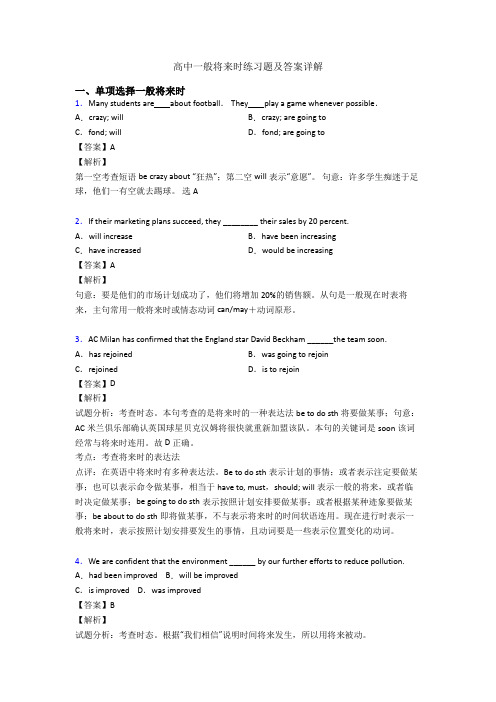
高中一般将来时练习题及答案详解一、单项选择一般将来时1.Many students are about football. They play a game whenever possible.A.crazy; will B.crazy; are going toC.fond; will D.fond; are going to【答案】A【解析】第一空考查短语be crazy about “狂热”;第二空will表示“意愿”。
句意:许多学生痴迷于足球,他们一有空就去踢球。
选A2.If their marketing plans succeed, they ________ their sales by 20 percent.A.will increase B.have been increasingC.have increased D.would be increasing【答案】A【解析】句意:要是他们的市场计划成功了,他们将增加20%的销售额。
从句是一般现在时表将来,主句常用一般将来时或情态动词can/may+动词原形。
3.AC Milan has confirmed that the England star David Beckham ______the team soon. A.has rejoined B.was going to rejoinC.rejoined D.is to rejoin【答案】D【解析】试题分析:考查时态。
本句考查的是将来时的一种表达法be to do sth将要做某事;句意:AC米兰俱乐部确认英国球星贝克汉姆将很快就重新加盟该队。
本句的关键词是soon该词经常与将来时连用。
故D正确。
考点:考查将来时的表达法点评:在英语中将来时有多种表达法。
Be to do sth表示计划的事情;或者表示注定要做某事;也可以表示命令做某事,相当于have to, must,should; will表示一般的将来,或者临时决定做某事;be going to do sth表示按照计划安排要做某事;或者根据某种迹象要做某事;be about to do sth即将做某事,不与表示将来时的时间状语连用。
一般将来时练习题基础、提高、难题_汇总(含答案)
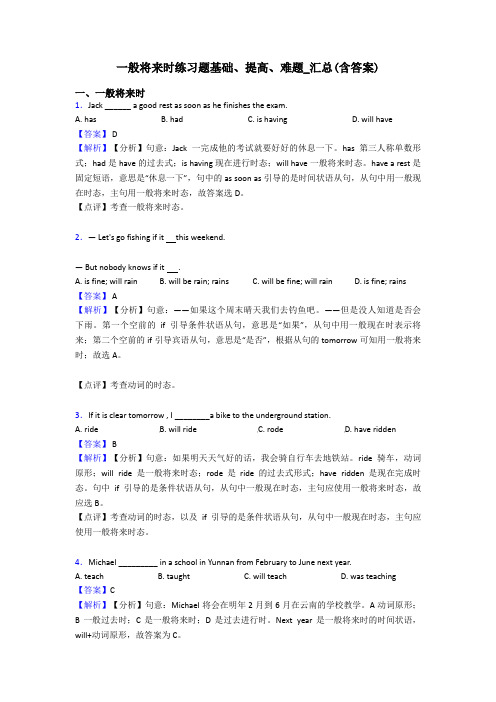
一般将来时练习题基础、提高、难题_汇总(含答案)一、一般将来时1.Jack ______ a good rest as soon as he finishes the exam.A. hasB. hadC. is havingD. will have【答案】 D【解析】【分析】句意:Jack一完成他的考试就要好好的休息一下。
has第三人称单数形式;had是have的过去式;is having现在进行时态;will have一般将来时态。
have a rest是固定短语,意思是“休息一下”,句中的as soon as引导的是时间状语从句,从句中用一般现在时态,主句用一般将来时态,故答案选D。
【点评】考查一般将来时态。
2.— Let's go fishing if it this weekend.— But nobody knows if it .A. is fine; will rainB. will be rain; rainsC. will be fine; will rainD. is fine; rains 【答案】 A【解析】【分析】句意:——如果这个周末晴天我们去钓鱼吧。
——但是没人知道是否会下雨。
第一个空前的if引导条件状语从句,意思是“如果”,从句中用一般现在时表示将来;第二个空前的if引导宾语从句,意思是“是否”,根据从句的tomorrow可知用一般将来时;故选A。
【点评】考查动词的时态。
3.If it is clear tomorrow , I ________a bike to the underground station.A. rideB. will rideC. rodeD. have ridden【答案】 B【解析】【分析】句意:如果明天天气好的话,我会骑自行车去地铁站。
ride骑车,动词原形;will ride是一般将来时态;rode是ride的过去式形式;have ridden是现在完成时态。
- 1、下载文档前请自行甄别文档内容的完整性,平台不提供额外的编辑、内容补充、找答案等附加服务。
- 2、"仅部分预览"的文档,不可在线预览部分如存在完整性等问题,可反馈申请退款(可完整预览的文档不适用该条件!)。
- 3、如文档侵犯您的权益,请联系客服反馈,我们会尽快为您处理(人工客服工作时间:9:00-18:30)。
一、选择题有详解:(相对练习二—四稍难。
)1. “The meeting is scheduled to begin at 7 o’clock.”“But _______ a delay.”A. It will beB. there’d beC. there will beD. there is2. He’ll leave for Paris before you ______ next week.A. will come backB. will be backC. come backD. came back3. Our next meeting _______ on 1st December.A. has been heldB. will holdC. is to be heldD. is holding4. Where ________ is a will, there is a way.A. there will haveB. has been thereC. there isD. there has been5. It ________ be Wednesday tomorrow.A. is going toB. willC. is about toD. is to答案及详解:1. 选C。
此中there is有“其中包括、有”的涵义。
本句表达会有延误,而非是个延误。
2. 选C。
before引导时间状语从句,在状语从句中一般现在时取代一般将来时。
且,一个简单句没有连词,不能有两个谓语动词。
3. 选C。
next meeting表将来,will do/shall do/be going to do/ be to/ be about to都可以表示将来时。
此中,会议被开要用被动,故,只能选择C。
4. 选C。
“有志者事竟成”固定句型。
此中,地点状语从句,一般现在时代替一般将来时。
5. 选B。
will do/shall do/be going to do/ be to/ be about to都可以表示将来时。
只是,willdo/shall do客观;而be going to do/ be to/ be about to都有计划打算的意思。
并不是星期三显然是客观事实,并不是打算计划。
二、用所给动词的一般将来时填空1. I ______(leave)in a minute. I ______(finish)all my work before I ______ (leave).2. —How long _____ you _____(study)in our country?—I _____(plan)to be here for about one more year.—I _____(hope)to visit the other parts of your country.—What ______ you ______(do)after you ______(leave)here?—I ______(return)home and ______(get)a job.3. I ______(be)tired. I ______(go)to bed early tonight.4. Mary’s birthday is next Monday, her mother _____(give)her a present.5. It is very cold these days. It ______(snow)soon.6. —_____ you _____(be)here this Saturday?—No. I ______(visit)my teacher.7. —______ I ______(get)you a copy of today’s newspaper?—Thank you.8. I am afraid there ______(be)a meet ing this afternoon. I can’t join you.9. Mike ______(believe, not)this until he ______(see)it with his own eyes.10. Most of us don’t think their team ______(win).参考答案:1. am leaving ; will finish ; leave2. will ; study ; plan ; hope ; will ; do ; leave ; will return ; get3. am ; will4. will give5. will snow6. Will, be ; will visit7. Shall ; get8. will be 9. won’t believe ; sees 10. will win三、单项选择1. There __________ a meeting tomorrow afternoon.A. will be going toB. will going to beC. is going to beD. will go to be2. Charlie ________ here next month.A. isn’t workingB. doesn’t workingC. isn’t going to workingD. won’t work3. He ________ very busy this week, he ________ free next week.A. will be; isB. is; isC. will be; will beD. is; will be4. There ________ a dolphin show in the zoo tomorrow evening.A. wasB. is going to haveC. will haveD. is going to be5. –________ you ________ free tomorrow?– No. I ________ free the day after tomorrow.A. Are; going to; willB. Are; going to be; willC. Are; going to; will beD. Are; going to be; will be6. Mother ________ me a nice present on my next birthday.A. will givesB. will giveC. givesD. give7. – Shall I buy a cup of tea for you?–________. (不,不要。
)A. No, you won’tB. No, you aren’t.C. No, please don’tD. No, please.8. – Where is the morning paper?– I ________ if for you at once.A. getB. am gettingC. to getD. will get9. ________ a concert next Saturday?A. There will beB. Will there beC. There can beD. There are10. If they come, we ________ a meeting.A. haveB. will haveC. hadD. would have11. He ________ her a beautiful hat on her next birthday.A. givesB. gaveC. will givingD. is going to give12. He ________ to us as soon as he gets there.A. writesB. has writtenC. will writeD. wrote13. He ________ in three days.A. coming backB. came backC. will come backD. is going to coming back14. If it ________ tomorrow, we’ll go roller-skating.A. isn’t rainB. won’t rainC. doesn’t rainD. doesn’t fine15. – Will his parents go to see the Terra Cotta Warriors tomorrow?– No, ________ (不去).A. they willn’tB. they won’t.C. they aren’tD. they don’t.16. Who ________ we ________ swimming with tomorrow afternoon?A. will; goB. do; goC. will; goingD. shall; go17. We ________ the work this way next time.A. doB. will doC. going to doD. will doing18. Tomorrow he ________ a kite in the open air first, and then ________ boating in the park.A. will fly; will goB. will fly; goesC. is going to fly; will goesD. flies; will go19. The day after tomorrow they ________ a vo lleyball match.A. will watchingB. watchesC. is watchingD. are going to watch20. There ________ a birthday party this Sunday.A. shall beB. will beC. shall going to beD. will going to be21. They ________ an English evening next Sunday.A. are havingB. are going to haveC. will havingD. is going to have22. ________ you ________ free next Sunday?A. Will; areB. Will; beC. Do; beD. Are; be23. He ________ there at ten tomorrow morning.A. willB. isC. will beD. be24. ________ your brother ________ a magazine from the library?A. Are; going to borrowB. Is; going to borrowC. Will; borrowsD. Are; going to borrows25. – Shall I come again tomorrow afternoon?–________ (好的).A. Yes, pleaseB. Yes, you will.C. No, pleaseD. No, you won’t.26. It ________ the year of the horse next year.A. is going to beB. is going toC. will beD. will is27. ________ open the window?A. Will you pleaseB. Please will youC. You pleaseD. Do you28. –Let’s go out to play football, shall we?– OK. I ________.A. will comingB. be going to comeC. comeD. am coming29. It ________ us a long time to learn English well.A. takesB. will takeC. spendsD. will spend30. The train ________ at 11.A. going to arriveB. will be arriveC. is going toD. is arriving参考答案:1. C2. D3. D4. D5. D6. B7. C8. D9. B 10. B 11. D 12. C 13. C 14. C 15. B 16. D 17. B 18. A 19. D 20. B 21. B 22. B 23. C 24. B25. A 26. A 27. A 28. D 29. B 30. D四、把下列各句译成英语1.我叔叔今晚要来。
